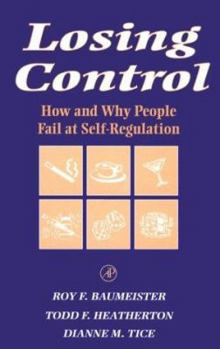Losing Control: How and Why People Fail at Self-Regulation
Select Format
Select Condition 
Book Overview
Self-regulation refers to the self's ability to control its own thoughts, emotions, and actions. Through self-regulation, we consciously control how much we eat, whether we give in to impulse, task performance, obsessive thoughts, and even the extent to which we allow ourselves recognition of our emotions. This work provides a synthesis and overview of recent and long-standing research findings of what is known of the successes and failures of self-regulation.
People...
Format:Hardcover
Language:English
ISBN:0120831406
ISBN13:9780120831401
Release Date:November 1994
Publisher:Academic Press
Length:322 Pages
Weight:1.35 lbs.
Dimensions:1.1" x 6.2" x 9.4"
Customer Reviews
4 ratings
Book Contains Many Insights On Addictive Behaviors
Published by Thriftbooks.com User , 14 years ago
As the mother of a child suffering from an eating disorder and with a spouse suffering from alcohol self-regulation issues, I found this book to contain a vast wealth of helpful information. Even though it was written in 1994, I found 15 years later that the book provides excellent material that I had not really seen published elsewhere on these topics. I keep going back to it time and time again in my search for answers to help my family members. On page 9 of the book, it mentions three items that are important ingredients for self-regulation including: 1) standards (for example, the thermostat cannot operate without being set on a particular target temperature); 2) monitoring the current circumstances (people can only regulate themselves successfully if they pay attention to what they are doing); and 3) people must have some means of operating on themselves in order to bring about the desired changes or responses. I wanted to write this review in the hope that this book can perhaps help others. Chapters address: Self-management: Taking care of yourself; Thoughts out of control; Failure to control emotions and moods; Controlling impulses and appetites such as alcohol, smoking, eating too much; Gambling, Shopping, Aggression and a section also on the Implications for Parenting.
The central idea of this work as major contribution to our way of thinking about ourselves
Published by Thriftbooks.com User , 16 years ago
This book reveals at the outset a central concept I for one have never really given serious thought to. It is the concept of self- control on how we 'override' all the time impulses, feelings, wishes,demands, habits. In other words it points to a picture of consciousness in which there is continual struggle and decision. Of course the main focus of the book is in describing and dealing with situations in which control has been lost, in which the self- regulation mechanism has failed. The authors contend that American society is today seeing a vast acceleration in the growth of 'loss of control' disorders.The various drug addictions, the obsessive behaviors in gambling, sexuality, other areas of life mark out this loss of our own ability to manage ourselves. Even in the area of overriding our own thoughts there is breakdown and loss of control. Reading and studying this work is then ideally a way of better knowing, and improving ourselves.
More meaty than any "self-help" book, more helpful too!
Published by Thriftbooks.com User , 21 years ago
I'm a reasonably successful professional, wife, and mother who has never had any problems with most of the things discussed in depth in this book (drug addiction, alcoholism, smoking, weight problems, obsessions, gambling, etc). The reason I bought the book was for the discussions of self-management. They've been very thought provoking for me. I have trouble with setting goals and achieving them, prioritizing, and "self-handicapping", especially procrastination. Now I can think more clearly about how I get in my own way, and I can develop better, more effective strategies for coping. The "implications for parenting" in the final chapter are also amazingly useful. Though pretty straightforward, they elegantly tie together so many common sense ideas about what good parenting is all about. Having standards. Monitoring. Enabling the child to develop self-control. Instilling the capacity to delay gratification. Challenging the child's ability to control his or her attention may not be as "common sense" as the others, but in context, I can see it's importance.Many thanks to the authors for a thought-provoking and well-written analysis.
Amazing Book
Published by Thriftbooks.com User , 24 years ago
As a psychology student (senior level undergraduate) who has gone through some major issues with self-regulation, this book provides incredible insight to why people fail at self-regulatory behaviors through an in depth critical review of literature. Amazingly written by credible researchers Baumister and Tice. Should continue to be in print, and should be offered as a text book for classes.




